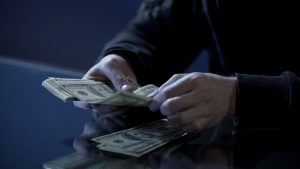You would think that a criminal, who has spent a substantial amount of time behind bars, might want to be wary of breaking the law again. Well, sad to say, Kyle McLemore, 44, of Philadelphia, Pa., apparently forged full steam ahead into another criminal act and is facing federal charges after being released from prison.
Sadly, McLemore was convicted in 1999 of murdering an individual and shooting three others on the University of Pennsylvania campus after a high school basketball game. He was released on parole from prison in 2020 after serving 21 years for the murder charges. (You would think that 21 years was an ample amount of time to drive home the point that breaking the law has dire consequences.)
McLemore is currently accused of fraudulently applying for and obtaining emergency unemployment benefits, through the Pandemic Unemployment Assistance (PUA) and Economic Injury Disaster Loan (EIDL) programs. He is charged with one count of mail fraud and two counts of theft of public money. (While this alleged crime didn’t involve any physical harm, it did take funds away from vulnerable communities in need.)
In May 2020, less than a week after he was released from prison, McLemore allegedly submitted a PUA application, falsely stating that he had lost his job due to the COVID-19 pandemic. McLemore also submitted weekly PUA certifications, falsely reporting that he was ready and able to accept a job if offered during a period when he was actually serving time in prison and unable to accept employment. (He was already reporting to his 9 to 5 job of serving his sentence behind bars.)
Additionally, McLemore is accused of submitting an EIDL program application in June 2020 to the Small Business Administration (SBA), providing false information about an alleged tobacco business that he claimed to own during a time when he was still in prison. In that application, he denied that he had been on probation or parole within the last five years. (That blatant lie was a bad idea.) To verify his EIDL application, the defendant submitted a forged business license from the City of Philadelphia. (Why not add forgery to the long list of crimes he’s committed? At this point, what’s more thing. The hole he’s digging keeps getting deeper and deeper.)
As a result of his fraudulent application and bogus weekly certifications, McLemore obtained $14,555 in PUA benefits. He also received an EIDL loan from the SBA for nearly $125,000. If convicted of all charges, the defendant faces a maximum possible sentence of 40 years in prison, three years of supervised release, a $750,000 fine, restitution, and a $300 special assessment. Keep in mind that today’s defendant is presumed innocent unless and until proven guilty. (Despite this fact, the evidence against him is highly convincing.)
Today’s Fraud of the Day comes from a Department of Justice press release, “Philadelphia Man Convicted for ’98 Palestra Murder Charged with Fraudulently Obtaining Pandemic Relief Funds Shortly After Prison Release,” published on November 9, 2021.
McLemore, 44, of Philadelphia, PA, was arrested and charged by Indictment with one count of mail fraud and two counts of theft of public money. In February 1999, the defendant was convicted on state charges of murdering an individual and shooting three others on the University of Pennsylvania’s campus after a high school basketball game. As alleged in the Indictment, shortly after he was released on parole from prison last year after serving 21 years for the murder charges, the defendant fraudulently applied for and obtained emergency unemployment benefits and loan funds related to the COVID-19 pandemic.
On March 27, 2020, the Coronavirus Aid, Relief, and Economic Security Act (CARES Act) was signed into law. The CARES Act created the Pandemic Unemployment Assistance (PUA) program, which provides unemployment benefits to individuals not eligible for regular unemployment compensation or extended unemployment benefits, including individuals, families, and businesses affected by COVID-19. The CARES Act also created the Economic Injury Disaster Loan (EIDL) program, which provides low-rate emergency loan options for struggling businesses.




